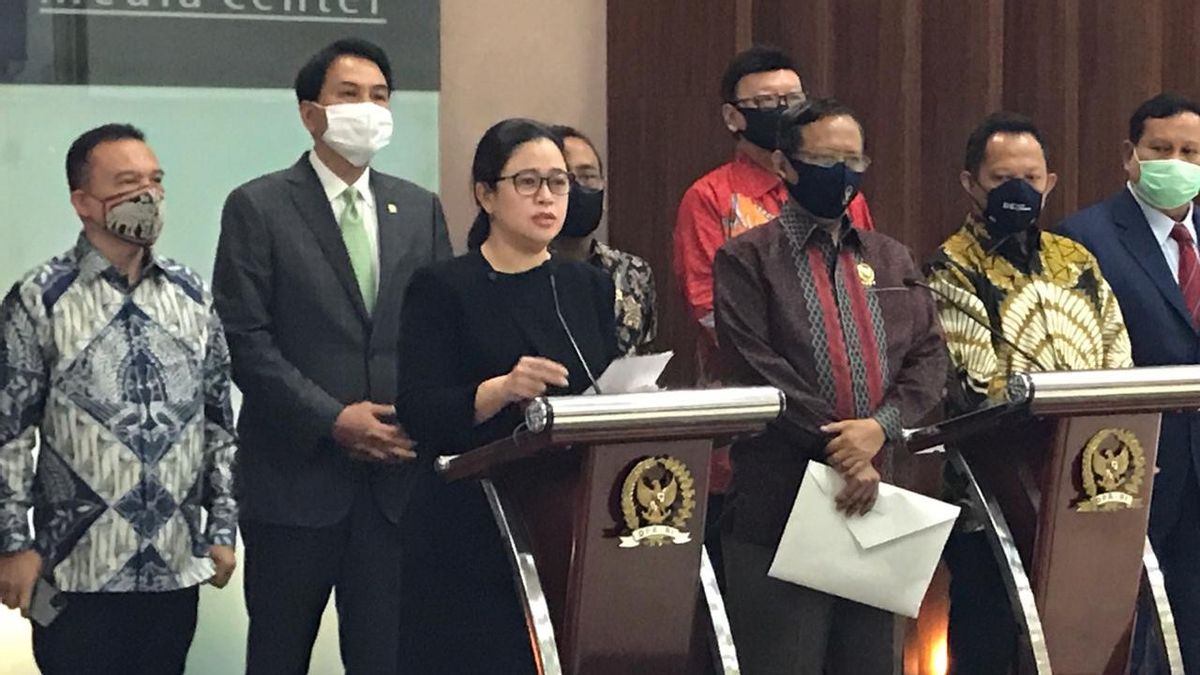JAKARTA - The government submitted the draft of the Pancasila Ideology Advisory Body (BPIP) Bill to the Indonesian Parliament for further discussion. This was conveyed by the Chairman of the Indonesian Parliament, Puan Maharani, after a closed meeting with a number of ministers in the Advanced Indonesia Cabinet representing the government.
The ministers who attended were the Coordinating Minister for Political, Legal and Security Affairs (Menko Polhukam) Mahfud MD, Minister of Home Affairs (Mendagri) Tito Karnavian, State Secretary Pratikno, Menkumham Yasonna Laoly, and Menpan-RB Tjahjo Kumolo.
"The DPR has just finished accepting government representatives or presidential envoys led by the Coordinating Minister for Political, Legal and Security Affairs to be able to submit the draft BPIP Bill as input to the DPR to discuss and accommodate the concepts to be discussed together or get public input," said Puan in a press conference at the DPR RI Building. , Senayan, Central Jakarta, Thursday, July 16.
Puan then explained that the draft of the BPIP Bill submitted by government representatives was different from the HIP Bill. The draft law, he said, contains the strengthening of the Presidential Regulation (Perpres) which regulates the Pancasila Ideology Advisory Board (BPIP).
If the HIP Bill contains 10 chapters and 60 articles, the BPIP Bill proposed by the government consists of 7 chapters and 17 articles containing the strengthening of BPIP institutions. "Meanwhile, controversial articles such as the interpretation of philosophy and the history of Pancasila no longer exist," he said.
The chairman of the PDI-P DPP said that the DPR and the government had agreed that the bill that was proposed by the government would not be discussed immediately. This is because both parties provide the widest possible opportunity for the public to study, provide suggestions, and criticize the BPIP Bill.
"The DPR and the government will discuss the BPIP Bill if the DPR and the government feel that they have received sufficient input from elements of the nation. So that the presence of the BPIP Bill is a strong legal requirement for efforts to foster Pancasila ideology through BPIP," he said.
Furthermore, with the existence of the BPIP Bill, the DPR hopes that there will be no more polemics in the community regarding the Pancasila Ideology Direction Bill (HIP) can end. "And we return to live in harmony and harmony against COVID-19," he said.
Previously, the Draft Law on HIP, which was the initiative of the DPR RI, was polemic and was disputed by many parties. The Indonesian Ulema Council (MUI), for example, through its edict highlighted several things such as the exclusion of TAP MPRS Number 25 / MPRS / 1966 of 1966 concerning the Prohibition of Communism / Marxism-Leninism in the draft law.
In addition, elements in the draft law are considered to be obscure and deviate from the meaning of Pancasila. One of them is in the Trisila and Ekasila sections which are considered as an effort to divide Pancasila.
This is contained in Article 7 of the HIP Bill which reads:
Paragraph (1) The main characteristics of Pancasila are justice and social welfare with a family spirit which is a combination of the principles of divinity, humanity, unity, democracy / political and economic democracy in one unit.
Paragraph (2) The main characteristics of Pancasila are in the form of trisila, namely: socio-nationalism, socio-democracy, as well as cultural divinity.
Paragraph (3) Trisila as referred to in paragraph (2) is crystallized in ekasila, namely mutual cooperation.
The English, Chinese, Japanese, Arabic, and French versions are automatically generated by the AI. So there may still be inaccuracies in translating, please always see Indonesian as our main language. (system supported by DigitalSiber.id)













